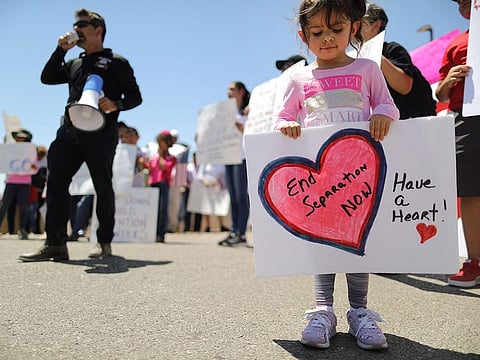Child migrants to be held in detention longer under new Trump administration rule
The rules, which are certain to draw a legal challenge, would replace a 1997 agreement

WASHINGTON: The Trump administration on Wednesday unveiled new rules that would allow officials to detain migrant families indefinitely while judges consider whether to grant them asylum in the United States.
The rules, which are certain to draw a legal challenge, would replace a 1997 legal agreement that limits the amount of time US immigration authorities can detain migrant children.
That agreement is generally interpreted as meaning families must be released within 20 days.
Administration officials blame the so-called Flores Settlement Agreement for a spike in immigration, especially of Central American families, saying it encourages migrants to bring children with them so they can be released into the United States while their court cases are pending.
Families typically have to wait several months for their cases to work their way through immigration court, and the new rule would allow DHS to keep those families at detention facilities.
The settlement had placed limits on how long children could be held in detention, leading the administration to release tens of thousands of families pending the resolution of their cases.
Acting Secretary of Homeland Security Kevin McAleenan, announcing the new rule, said those releases were an incentive for immigrants to travel with children and that the government believes the new detention rule will have a deterrent effect.
McAleenan said the government believes some families apprehended on the border were “fraudulent” based on DNA testing of some migrants in pilot programmes implemented in recent months.
“No child should be a pawn,” McAleenan said at a news conference announcing the rule. “Or as one gentleman in Guatemala told me, ‘as a passport to the United States.’”
The rule will be published in the Federal Register on Friday and will take effect 60 days from that publication. The implementation deadline could slip, however, depending on the success of the likely court challenges.
The American Academy of Paediatrics has repeatedly said that detention is not suitable for children, who may suffer numerous negative physical and emotional symptoms. Officials said the families would receive mental health treatment and other services.
President Donald Trump has made a crackdown on immigration, legal and illegal, central to his presidency. The administration unveiled a sweeping rule last week that would deny visas and permanent residency to poor migrants, a move that experts say could cut legal immigration in half.
Immigration officials have struggled to handle a surge of families and children fleeing violence and poverty in Central America that have at times overwhelmed border officials.
DHS officials say they have apprehended 390,000 family units since last October.
The government currently has only between 2,500 and 3,000 detention beds for family units and said any expansion of detention facilities will meet a high standard of care in “campuslike” settings.
The administration has faced harsh criticism of its temporary border patrol stations, where lawyers and internal government watchdogs reported hundreds of children and families being held in squalid conditions. McAleenan said the new rule will allow officials to transfer families to more appropriate facilities and would allow families to stay together.
The administration sought to deter migrants last year through a “zero tolerance” policy that separated thousands of children from their parents. But it abandoned the effort following widespread public outrage.
Hundreds of families, however, are still being separated if the government deems the parent a risk to the child. A pending legal challenge by the American Civil Liberties Union claims those ongoing separations are often based on flimsy evidence or minor crimes like traffic violations.
Sign up for the Daily Briefing
Get the latest news and updates straight to your inbox



